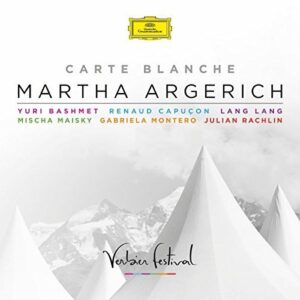Deutsche Grammophon doesn’t miss a beat. No sooner does its boxed set devoted to Martha Argerich’s complete DG recordings appear than the yellow label brings out Carte Blanche, a two-disc set preserving the July 27, 2007 Verbier Festival “Argerich and Friends” concert, featuring the celebrated pianist with some of her long-standing chamber and piano ensemble partners, plus a few newcomers like Lang Lang.
For Argerich watchers, the repertoire is predictable and seemingly redundant. Indeed, five of the works were performed a month earlier in Lugano and released as part of EMI’s ongoing Argerich/Lugano series. However, close listening reveals appreciable differences, more in regard to detail than interpretive values. Furthermore, the Verbier concert is more tightly miked than the relatively resonant EMI Lugano recordings.
This proves a slight disadvantage in Schumann’s Kinderszenen, where EMI’s equalization takes the edge off of Argerich’s sharp accents and perky inner voices. All four commercially released Argerich Kinderszenens abound with impetuous voicings and phrasings that arguably overload the music, yet each version is unique (to my ears, her 1982 studio traversal is the simplest and the best of the batch). On the other hand, EMI’s ambience adds appropriate weight and gravitas to Bartók’s First Sonata, although Argerich and violinist Renaud Capuçon benefit from added adrenaline and rhythmic thrust in the Verbier Finale movement.
Both the EMI and DG Beethoven “Ghost” Trios feature hard driven outer movements and a hauntingly disembodied slow movement, but Verbier violinist Julian Rachlin’s occasional reticence yields to Capuçon’s more assertive projection in Lugano. Alternately, the Argerich/Lang Lang Schubert Rondo, though ravishingly executed, sounds indulgently pulled about when heard alongside the comparably flexible yet infinitely more proportioned 2009 Argerich/Nelson Freire Salzburg performance. Similarly, Ravel’s Ma Mère l’Oye draws attention more to the pianists than to the music with Lang Lang in tow, while the Argerich/Pletnev DG recording is refined and ensemble oriented.
For me, violist Yuri Bashmet’s eloquent and gorgeously sculpted interpretation of Schubert’s Arpeggione Sonata represents this concert’s high point. The Allegretto in particular adds up to a master class in how to make phrases speak as well as sing, how to gently recede when assuming an accompanying role, and how to imbue pizzicato passages with the utmost in tonal variety. Notice also in the sublime slow movement how subtly he shifts his color and timbre on long, sustained single notes in reaction to the piano part’s changing harmonies. This is something from which all aspiring singers can learn. Certainly Bashmet inspires some of Argerich’s most focused and characterful collaborative work on disc; indeed, the pianist’s response to this music has deepened since her 1985 studio traversal with cellist Mischa Maisky.
The witty and acerbic Lutoslawski Paganini Variations usually bring out the best in Argerich and whomever her pianistic partner is at the moment, be it Freire in the studio, Mauricio Vallina in Lugano, or here alongside Gabriela Montero. As an encore, Montero improvises a set of “Happy Birthday” variations, loosely footed in the style of a traditional Brazilian chorino, but with a few hints of samba toward the end. However one views this release’s repertoire and the pluses and minuses of the performances in the context of multiple Argerich versions, it’s worth buying for the Schubert Arpeggione alone.
































